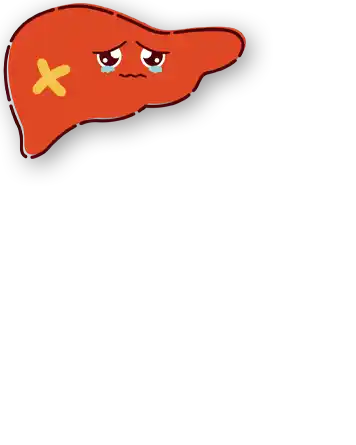Understanding and Combating a Global Health Challenge
Hepatitis Awareness Week, culminating on World Hepatitis Day on July 28, is an opportunity for the world to focus its collective lens on an often-overlooked but critical health challenge. It's a week dedicated to education, prevention, and a firm stance against one of the most widespread liver-related illnesses. So, whether you’re brushing up on prevention tips or wondering what your liver's been up to lately, this week is your chance to learn, share, and act.
What is Hepatitis?
Hepatitis is essentially your liver’s way of waving a red flag and saying, “Something’s not right down here!” This inflammation can stem from various causes, including viral infections, excessive alcohol use, certain medications, or autoimmune diseases. And because every good drama needs a cast of characters, hepatitis gives us five distinct types: A, B, C, D, and E. Let’s meet the crew:
- Hepatitis A (HAV): Transmitted through ingestion of contaminated food or water. It is often associated with poor sanitation and hygiene.
- Hepatitis B (HBV): Spread through contact with infectious body fluids, such as blood, semen, and vaginal fluids. Common transmission routes include unprotected sex, sharing needles, and from mother to child during childbirth.
- Hepatitis C (HCV): Primarily spread through blood-to-blood contact, often via shared needles among drug users. It can also be transmitted through unsterilized medical equipment.
- Hepatitis D (HDV): Occurs only in those infected with HBV. It is transmitted through contact with infectious blood.
- Hepatitis E (HEV): Transmitted through ingestion of fecally contaminated water. It is common in areas with poor sanitation.
The Global Impact of Hepatitis
Hepatitis remains a major global health concern, with millions of new infections each year. Chronic hepatitis B and C are particularly worrisome as they can lead to severe liver diseases, including cirrhosis and liver cancer.
- Hepatitis B: An estimated 296 million people globally live with chronic hepatitis B. Despite being preventable through vaccination, it remains a leading cause of liver cancer.
- Hepatitis C: Approximately 58 million people live with chronic hepatitis C, with around 1.5 million new infections occurring annually. While there is no vaccine for HCV, effective treatments are available that can cure most cases.
Symptoms and Diagnosis
Hepatitis often presents with a range of symptoms, which can vary in severity. Acute hepatitis can be asymptomatic or cause mild flu-like symptoms, while chronic hepatitis may not show symptoms until severe liver damage has occurred.
Common symptoms include:
- Fatigue
- Jaundice (yellowing of the skin and eyes)
- Dark urine
- Abdominal pain
- Nausea and vomiting
- Loss of appetite
- Joint pain
Diagnosis typically involves blood tests to detect the presence of hepatitis viruses or the antibodies produced in response to infection. Imaging studies and liver biopsies may be used to assess liver damage.
Preventive Measures and Treatments
Preventing hepatitis involves a combination of vaccination, safe practices, and public health measures. Here are some key strategies:
- Vaccination: Safe and effective vaccines are available for hepatitis A and B. Vaccination is the most effective way to prevent these types of hepatitis.
- Safe Injection Practices: Avoiding the sharing of needles and ensuring the use of sterilized medical equipment can prevent hepatitis B and C.
- Safe Sex Practices: Using condoms and reducing the number of sexual partners can help prevent the spread of hepatitis B.
- Good Hygiene and Sanitation: Handwashing, safe food handling, and access to clean water can prevent hepatitis A and E.
Treatment options include:
- Antiviral Medications: Effective antiviral treatments are available for chronic hepatitis B and C, which can reduce the viral load and prevent liver damage.
- Lifestyle Changes: Reducing alcohol consumption and maintaining a healthy diet can help manage liver health.
- Regular Monitoring: People with chronic hepatitis need regular monitoring to detect any progression of liver disease early.
Raising Awareness and Support
Hepatitis Awareness Week is an opportunity to educate communities about the importance of prevention, early detection, and treatment of hepatitis. Public health campaigns, community events, and educational programs play crucial roles in spreading awareness and combating stigma associated with the disease.
 Getting involved in Hepatitis Awareness Week can take many forms, from participating in local events to leveraging digital platforms for broader reach. One effective way to raise awareness is by joining or organizing community events such as health fairs, informational sessions, and awareness walks. These events provide an interactive platform for distributing educational materials, offering free screenings, and connecting people with healthcare providers. Engaging local media can also amplify the message, reaching a wider audience through news coverage and public service announcements.
Getting involved in Hepatitis Awareness Week can take many forms, from participating in local events to leveraging digital platforms for broader reach. One effective way to raise awareness is by joining or organizing community events such as health fairs, informational sessions, and awareness walks. These events provide an interactive platform for distributing educational materials, offering free screenings, and connecting people with healthcare providers. Engaging local media can also amplify the message, reaching a wider audience through news coverage and public service announcements.
Social media is a powerful tool for raising awareness and sharing information. By using platforms like Facebook, Twitter, Instagram, and LinkedIn, individuals and organizations can post educational content, personal stories, and updates about local events. Creating hashtags related to Hepatitis Awareness Week can help unite efforts and create a larger, more impactful conversation. Encouraging followers to share their experiences and knowledge can also foster a supportive community online.
Supporting organizations dedicated to hepatitis research, support, and advocacy is another critical way to contribute. Many non-profits and health organizations work tirelessly to provide resources, fund research, and advocate for better healthcare policies. Donating to these organizations can help them continue their valuable work. Volunteering time and skills can also make a significant difference, whether it's helping organize events, creating educational content, or providing administrative support.
Education is a cornerstone of Hepatitis Awareness Week. Schools, universities, and workplaces can play an essential role by incorporating hepatitis education into their health programs. Hosting workshops, inviting healthcare professionals for talks, and distributing informational brochures can significantly increase knowledge and awareness. Educating younger generations about the risks and prevention methods can lead to long-term changes in behavior and attitudes towards hepatitis.
Healthcare providers can also contribute by offering free or low-cost screenings during Hepatitis Awareness Week. Early detection is crucial for effective treatment and management of hepatitis. By making screenings more accessible, healthcare providers can help identify undiagnosed cases and connect patients with necessary medical care. Providing information about vaccination programs, especially for hepatitis A and B, can also help increase vaccination rates and prevent new infections.
Combating stigma associated with hepatitis is another important aspect of raising awareness. Misconceptions and negative attitudes can prevent people from seeking testing and treatment. Public health campaigns should focus on dispelling myths and providing accurate information about how hepatitis is transmitted and treated. Sharing personal stories of those living with hepatitis can humanize the disease and foster empathy and understanding within the community.
Collaboration between various stakeholders, including government agencies, healthcare providers, non-profits, and the general public, is essential for a successful Hepatitis Awareness Week. By working together, these groups can pool resources, share expertise, and create a comprehensive approach to combating hepatitis. Partnerships with local businesses can also enhance outreach efforts, as businesses can help distribute information and host events.
Lastly, continuous advocacy for better healthcare policies and increased funding for hepatitis research and prevention programs is vital. Advocates can work with policymakers to ensure that hepatitis remains a priority in public health agendas. Pushing for greater access to healthcare services, including vaccination and treatment programs, can lead to better outcomes for those affected by hepatitis.
Hepatitis Awareness Week is more than a week of observance; it's a call to action. By raising awareness, educating the public, and supporting those affected by hepatitis, we can make a significant impact on reducing the prevalence and burden of this disease. Together, we can create a world where hepatitis is no longer a global health threat.
Ways to get involved
- Participate in Awareness Events: Join or organize local events, such as health fairs, informational sessions, and community walks.
- Share Information: Use social media platforms to share educational content and personal stories about hepatitis.
- Support Organizations: Contribute to or volunteer with organizations dedicated to hepatitis research, support, and advocacy.
Hepatitis Awareness Week serves as a crucial reminder of the global impact of hepatitis and the importance of collective action to combat this disease. By educating ourselves and others, promoting preventive measures, and supporting those affected, we can make significant strides in reducing the burden of hepatitis worldwide. Remember, awareness is the first step towards prevention and cure—let's use this week to make a difference.
Please Share our Content






 Getting involved in Hepatitis Awareness Week can take many forms, from participating in local events to leveraging digital platforms for broader reach. One effective way to raise awareness is by joining or organizing community events such as health fairs, informational sessions, and awareness walks. These events provide an interactive platform for distributing educational materials, offering free screenings, and connecting people with healthcare providers. Engaging local media can also amplify the message, reaching a wider audience through news coverage and public service announcements.
Getting involved in Hepatitis Awareness Week can take many forms, from participating in local events to leveraging digital platforms for broader reach. One effective way to raise awareness is by joining or organizing community events such as health fairs, informational sessions, and awareness walks. These events provide an interactive platform for distributing educational materials, offering free screenings, and connecting people with healthcare providers. Engaging local media can also amplify the message, reaching a wider audience through news coverage and public service announcements.








 "Sláinte!" is a traditional Irish expression used as a toast, equivalent to "Cheers!" in English.
"Sláinte!" is a traditional Irish expression used as a toast, equivalent to "Cheers!" in English.